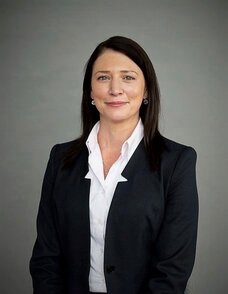
As acting Chief Executive Officer of the City of Melbourne, Alison Leighton will be at the helm in as Council begins 2023 with major projects around urban greening, post-pandemic commercial renewal, clean energy and housing.

She says the next 12 months will take Council closer to achieving our mission of powering the city with 100 per cent renewable energy by 2030 with the Power Melbourne neighbourhood-scale battery network.
GN asked Ms Leighton about the challenges of 2022, her hopes for 2023 and how Council is responding to changes in the LGA.
At a glance:
- Glad to see the end of: Covid disruptions, cutbacks and drop in visitation
- Projects for 2023: Transforming the north bank of the Yarra River via the Greenline project to create one of Melbourne’s largest networks of green spaces
- Excited about: continuing the post-Covid bounce back.
- Biggest change affecting LGA: continuing to adapt to hybrid working and attracting world class talent in a competitive global environment
GN: How did 2022 treat your council and what did you learn from it?
It is no surprise that 2022 has come with its challenges as Melbourne has continued to bounce back from the pandemic, however, we have learned a great deal this year.
The aftermath of the pandemic highlighted the fundamental role that local government plays in improving the wellbeing of its communities.
We’ve learned to be agile – quickly adapting our operations to ever-changing restrictions and renewed our focus on the delivery of essential services and support for local businesses through rates relief, grants, and business concierge services.
Like many other organisations, we’ve gained a new understanding for digital capabilities – with a more flexible approach to remote working. This extended to our community engagements with a seven per cent increase in requests for Council services via our digital channels, and now being higher than pre-pandemic levels.
Our strong partnerships have played a significant role during this time, as we successfully negotiated a $300 million joint recovery and revitalisation fund with the Victorian Government to deliver key initiatives like the Melbourne Money local hospitality rebate initiative to bring people back to the city.
Now more than ever, we need to give people a reason to visit the city. Our focus is on highlighting incredible experiences – from retail to food and everything in between – that can only be experienced in the city, and we recently launched our Only in the City campaign to do just that.
How is your financial outlook for the coming year, and do you have any interesting projects planned that you’d like to share?
Our focus is progressing city-shaping infrastructure projects and major initiatives, such as Greenline that will transform the north bank of the Yarra River – Birrarung into a vibrant promenade, attracting visitors and investment back into the city. It will be one of the largest networks of green spaces in Melbourne, ushering in a new era for our city.
The city’s iconic Queen Victoria Market will also be reinvigorated – creating one of the largest public spaces in the CBD for city residents, workers, and visitors to use and enjoy. The new Munro Library and Community Hub is transforming the precinct into an epicenter of imagination, learning and wellbeing.
The next 12 months will take us closer to achieving our mission of powering the city with 100 per cent renewable energy by 2030 and net zero emissions by 2040, as Power Melbourne, our neighbourhood-scale battery network, continues to gain momentum.
Council’s landmark Make Room project will take shape, thanks to Homes Melbourne – a special entity, created in early 2022 to reduce homelessness and increase safe, secure, and affordable housing in the city. We’ve raised $15.5 million for the $20 million project, which will convert a Council-owned building into up to 50 studio apartments, multi-use spaces and support services for people experiencing homelessness.
Alongside these major projects, we are committed to continuing our support for our city’s economic recovery, furthering our grants programs, continuing to waive and discount fees for outdoor dining and busking, and encouraging visitation by reminding Melburnians of just how magnetic our city is.
What are you most looking forward to in 2023?
I am looking forward to continuing to deliver on our ambitious Council Plan, with major initiatives and projects such as Greenline, the Queen Victoria Market Precinct Renewal, Power Melbourne, and Make Room.
I’m looking forward to continuing our sustained bounce-back in 2023 – continuing to see the return of office workers, and even more Melburnians enjoying what the city has to offer through our bustling major events calendar.
Within the organisation I am focused on driving our cultural transformation by creating more opportunities for empowerment amongst our workforce, Team Melbourne and investing in our leaders by delivering a new leadership development program.
What do you expect the biggest challenges will be for you in 2023?
Team Melbourne is adjusting to post-pandemic, hybrid ways of working and a key challenge that most organisations are facing, is attracting, and retaining quality talent in the globally competitive market.
I’m committed to making the City of Melbourne an even better place to work through a focus on maximising our employee value proposition – by improving office accommodation, investing in better technology and building on our cultural transformation so that staff feel safe, valued, and empowered
How is your LGA changing and what are you doing to adapt?
In 2022 we launched new online Neighbourhood Portals, to help locals connect and share ideas for the future. This leading initiative is a new place-based approach designed to help Council connect with, understand and respond to unique communities across the municipality The model will ensure a continuous cycle of community engagement, where local knowledge and priorities are translated into action, investment and advocacy.
The City of Melbourne is more than just a place where people come to work, it’s transformed into a magnetic 24-hour city that is a destination of choice for weekends and weeknight experiences.
We know that Melbourne’s vibrant hospitality scene is leading the city’s sustained bounce back with 167 new restaurants, bars and entertainment venues opening this year.
The city plays host to several major events which have attracted hundreds of thousands of people back to Melbourne – like Moomba, Firelight Festival, and the Christmas Festival.
Our ongoing efforts to reactive the city have led to an increase in weekend and night-time pedestrian activity and spending, which regularly exceed pre-COVID levels.
Melbourne is settling into a new rhythm, and we are doing what we can to harness these changes by positioning ourselves as not just a traditional central business district, but a ‘central experience district’ for all Melburnians and visitors to enjoy.
*Alison Leighton is the acting Chief Executive Officer of the City of Melbourne, more than 17 years of leadership experience in infrastructure, planning, operations and public sector business transformation.
She joined the City of Melbourne in April 2020 in a General Manager role and was promoted to the position of Deputy Chief Executive Officer six months later, leading the portfolios of Strategy and Planning; Property, Infrastructure and Design; People, Culture and Leadership; and Aboriginal Melbourne.
Prior to joining the City of Melbourne, Ms Leighton was CEO at Baw Baw Shire Council and Chief Operating Officer at Mornington Peninsula Shire.
In 2017 Ms Leighton was recognised in the inaugural Top 50 Public Sector Women initiative.
Comment below to have your say on this story.
If you have a news story or tip-off, get in touch at editorial@governmentnews.com.au.
Sign up to the Government News newsletter
Most read
Scathing report finds little has changed at PwC
Qld council welcomes progress on massive battery system
Inquiry to consider how federal govt can address councils’ sustainability issues
‘Local’ procurement turns out not to be so local, committee hears
Another report finds local government falling down on cyber security